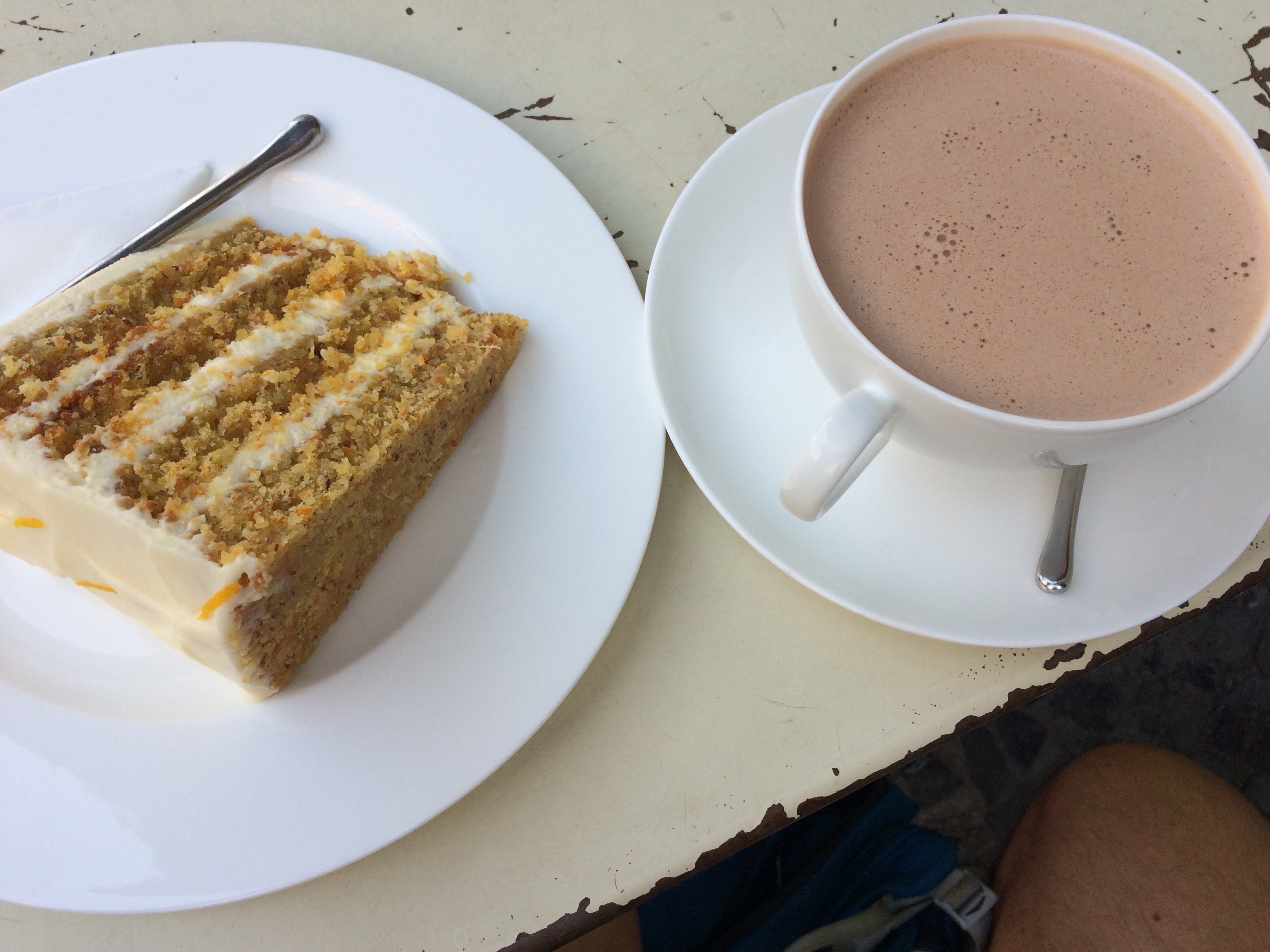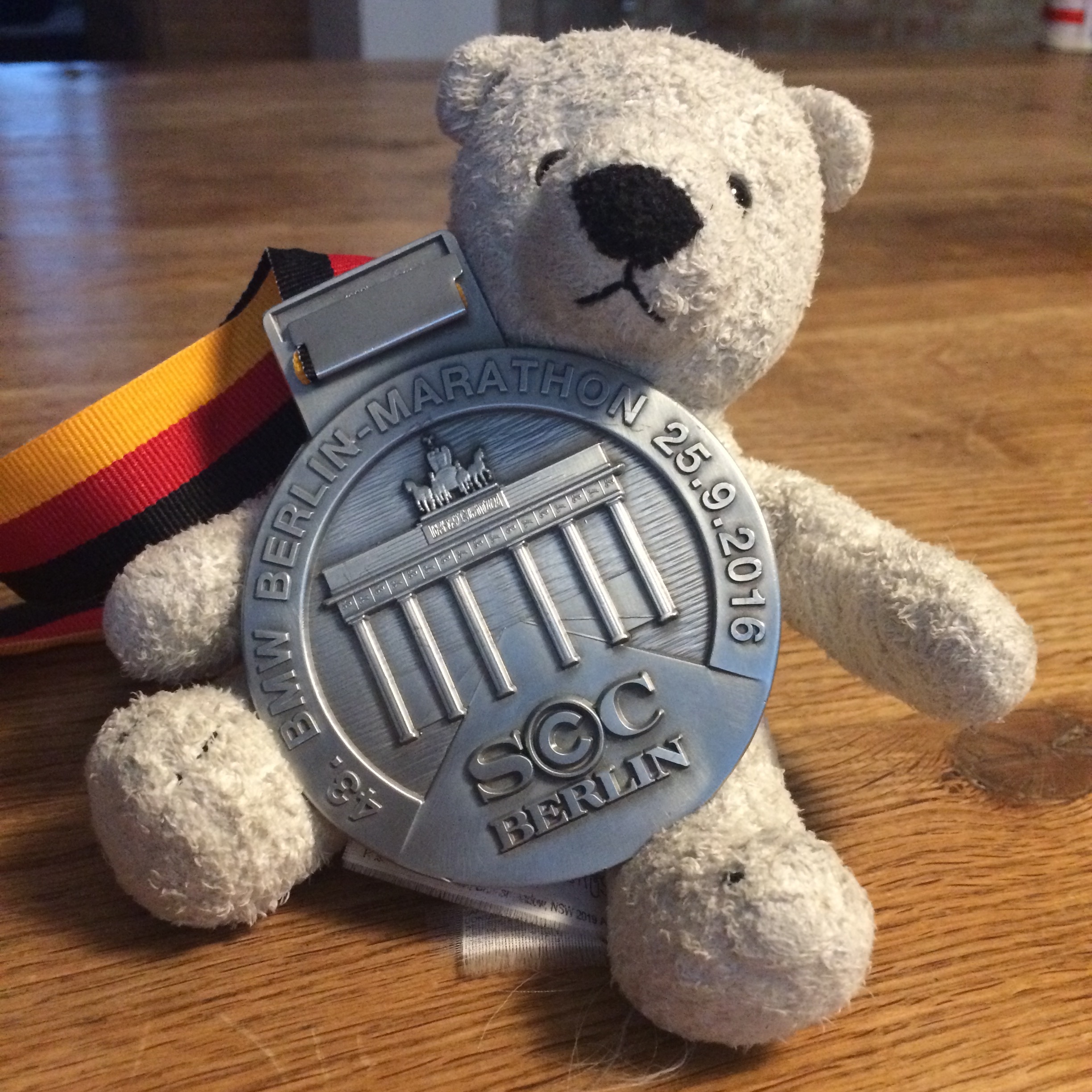This past weekend I ran the Berlin Marathon for the third time. The first time my friend Ed Shattock paced me to what is still my marathon PB (as told in Blazing Through Berlin). The second time was a bit of a fiasco as I unwittingly ran the race with a 103° fever (see Grappling with Grippe in Berlin). This time I decided to try a really different approach to racing and set my goals for the race not on finish time but on my success in spending as much of the race as possible in a 'flow' state, and on enjoying this race more than I have some past races.
I have spent a lot of time this year thinking about what I feel is my greatest weakness as a runner which I would describe as 'succumbing to negative mental chatter.' This issue turns up fairly late in races (I've had a bunch of DNFs after completing 70-80% of a race) and is generally the result of entering a downwards mental spiral as both body and mind fatigue. It starts out with concern about how long the current kilometer is taking, then moves on to constant recalculation of projected finish time based on all future kilometers being at least this slow, then contemplation of how many hours of suffering this might entail, and worry that I have slowed down even more while I was worrying so I check my watch again and start recalculating, and despairing, and recalculating, and despairing, and eventually the idea of continuing on past the next checkpoint seems like a very bad idea. Then I start worrying about whether I can even reach the next checkpoint. And back around and down my mind spins. Somewhere in this process all objectivity is lost. All ability to analyse what is really going on and what might fix it is banished. The only ray of hope is the possibility of eventually being allowed to stop.
Fortunately in marathons things don't ever get quite that bad as I am fit enough that I know that I can get through 26.2 miles even on a bad day, and I know that there are neither mountains nor long, very steep hills to be reckoned with. Even without the full downward spiral, a marathon can still become a very unfun activity if one allows this negativity to run unchecked.
One easily silenced piece of chatter is the constant data stream from technology. I disabled the audible alarms on my GPS watch so that it does not beep at me (thus drawing my attention to it) every time it thinks I have covered another kilometer. Once I started the race I almost immediately set the watch to display only data related to my heartrate. This is a good indication of how hard one is working and is useful to both encourage me to work harder and to serve as a guide when I am working too hard. This simple change had a profound impact on how the race felt. One of the biggest problems with GPS watches is inaccuracy. I generally find myself noticing, and worrying about, the difference between when my watch thinks I have completed a kilometer and when I actually pass a kilometer marking on the course. One of the ramifications of this difference existing is that if you are using the watch as a guide to pace then you are being mislead, and probably running slower than you realise. The comparative mental quiet I found by simply allowing the course markings to be the only data I had about distance covered was quite calming. Unexpectedly I found that simply removing this whole idea of 'watch kilometers' and 'course kilometers' allowed me to feel much more present within the race.
This still leaves the problem of how to corral negative thoughts as the race gets tough. Some number of years ago I heard a radio interview with Bill Shoemaker who was for many years the top horseracing jockey in the world. The interviewer asked Mr. Shoemaker what it was that he did during races that made him so exceptionally good. His response was essentially 'as little as possible.' He went on to explain that the horse knows how to run and how to race, that the jockey is mostly a passenger, and that the job of the jockey is secondarily to offer small bits of advice and encouragement to the horse, and primarily to stay out of the horse's way. I think this is a good metaphor for the role your brain should play while running races. In my experience it is often the case that when running feels hard I am consciously trying to run and thus interfering with the more efficient stride my body would have without my interference. This is where meditation enters the picture. Meditation is all about quieting the mind, being present in the moment, and observing the state of one's body without seeking to alter it. Sounds like the perfect antidote for my negative mental chatter. There was just one small problem: on race day I had been doing daily ten minute meditation sessions for all of thirty-five days.
My approach to the race was very simple: from the start pick an object in the distance (the Siegessäule makes a very convenient first point) and focus on that object while trying to enter a meditative state. Once the object was too close or the course turned, pick the next object, repeat. I had a fair amount of success with this, and had some longish stretches where I really felt very light and easy as I ran. There really were stretches were I felt like I was observing that my body was running which is quite different from feeling like I was running. Very uncharacteristically I actually missed some of the kilometer markings and was then surprised to discover that I was further along the course than I had thought. All good for the first half of the race, although one does expect that to be the easy bit. The second half got tougher, and I did have some moments of wondering why I was doing this race, although I also had long stretches where I felt amazing and really felt like meditation was carry me to my best-ever finish. When I felt physically challenged or mentally negative I tried to return my attention to a point of focus and expended some effort trying to quiet my breathing. As I fatigued, mentally more than physically, it was progressively harder to reassert mental calm, but I never stopped trying. While my focus did waver, I found that I could at least turn my mind from negative thoughts onto the attempt to reclaim focus and calm. The major impact of the mental fatigue was that I found myself dropping more and more into an awareness of the gap between kilometer markings and was definitely aware that some of them seemed very far apart. Fortunately I wasn't allowing my watch to tell me how long each kilometer actually was taking, so I wasn't overly disturbed by this. In retrospect the apparent lengthening of the kilometers was partly mental fatigue, and partly simple reality as I was in fact slowing down. The stretch from kilometer 38 to kilometer 40 seemed to take forever. When I finally hit kilometer 40 and saw the time on the clock I realised that the only possible way I was going to get a PB would be to run sub-4:00 kilometers and that definitely wasn't going to happen. Had I been focused on time this would have been upsetting. Instead I took this fact as permission to take it easy for the last stretch and actually walked a bunch of the forty-first kilometer. This was not head down, beaten, depressed walking though. This was head high, big grin on my face, soaking in the atmosphere and reveling in a sense of accomplishment walking. I then ran nice and easy for the last stretch, soaked in the experience of running through the Brandenburg Gate, and cruised across the finish line feeling happy.
Almost as soon as I had crossed the finish line and let myself really relax I realised not just how tired I was, but how much my right leg hurt. Right in that spot I had tweaked on track a couple of weeks ago. That niggle I thought had gone away. Oh, maybe that had something to do with slowing down. Sure enough a look at my Garmin data (which I was allowed now that the race was over) shows that I was favoring that leg for more than half the race. I hadn't had any awareness of pain, but my body had definitely adjusted to protect it. The truly intriguing question this raises is whether the mental tricks I was playing somehow silenced the part of my brain that might have tried to use the leg as an excuse to slow down more and walk more. Given that my brain will generally try to lie to me about things being wrong when they aren't, it is almost shocking that I wasn't even aware that something was actually wrong during the race.
I definitely plan on continuing daily meditation to improve my mental strength, and look forward to seeing how useful these techniques are in future races. In the meantime I can very much celebrate not just running a decent race (coming in with a 3:36:46 for those who care), but an enjoyable one. And then there was cake. And a bear.



Leave a comment